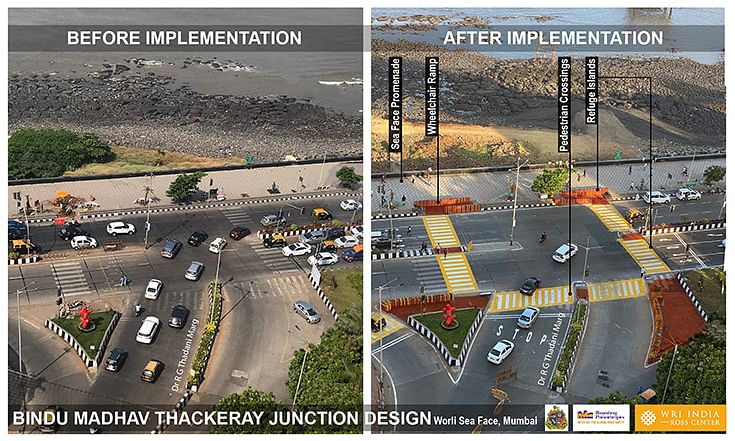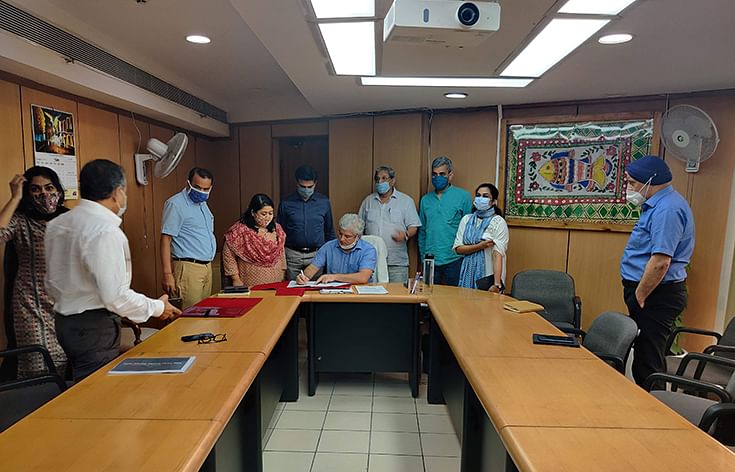Bloomberg Philanthropies’ Kelly Larson: ‘We are expanding the road safety initiative in India.’
The Delhi government has partnered with Bloomberg Philanthropies Initiative for Global Road Safety to help improve road safety in the capital, says Kelly Larson, Director – Road Safety, Drowning Prevention Program, Bloomberg Philanthropies.
On August 13, the Delhi government inked an MoU with the Bloomberg Philanthropies Initiative for Global Road Safety to help improve road safety in the capital, says Kelly Larson, Director – Road Safety, Drowning Prevention Program, Bloomberg Philanthropies.
Earlier this year, Bloomberg Philanthropies launched a new phase of Bloomberg Philanthropies Initiative for Global Road Safety, which will run through 2025 and has a special focus on speed reduction. The organisation will be working with the governments of Delhi, Karnataka (Bangalore), and Maharashtra (Mumbai), as well as others, including the government of India to improve road safety and reduce road crashes and fatalities.
What is the Bloomberg Philanthropies Initiative for Global Road Safety and how will it support road safety work in India?
Since 2007, Bloomberg Philanthropies has supported governments to undertake and implement data-driven, proven road safety strategies to make the world’s roads safer. Globally, more than 1.35 million people die from road crashes each year and up to 50 million more are injured. These crashes are preventable.
The Bloomberg Philanthropies Initiative for Global Road Safety first partnered with the government of India in 2010 and began engaging with Mumbai in 2015. As a participant in BIGRS, cities and countries gain access to a vast network of experts in fields including: police enforcement, safer streets and safer mobility, communication, data and policy.
We support cities, states, and countries in implementing best-practice interventions that address the key road safety risk factors: speeding, helmet use, drink driving, and seatbelt use. Earlier this year, we launched a new phase of BIGRS, which will run through 2025 and has a special focus on speed reduction. We are expanding this initiative globally, including in India, and will be working with the government of India, as well as Delhi, Bangalore, and Mumbai with plans to work throughout the state of Maharashtra.
What have been the key learnings from your road safety project in India?
Having strong leadership from national, state, and city leaders has been instrumental to the success of BIGRS. Since we began supporting road safety in 2007, our success has been the result of high-level political will for saving lives on the world’s roads. Road traffic fatalities are often caused by roads that are designed for speed, not for pedestrians, bicyclists and motorcyclists. A large part of our support is geared toward helping cities redesign their streets, making them safe for all road users, and enforcing the key road safety risk factors – helmet use, speed, drinking and driving and seatbelt use. In the case of India, leadership at all levels of government are committed to road safety and we’re looking forward to continuing to make an impact together.
What, in your opinion, are the key challenges in India?
A key challenge in any country is weak road safety laws and a lack of political commitment to strengthen and implement these laws. India committed to strengthening its road safety law 2014, and after a lot of hard work and strong leadership, the 2019 Motor Vehicles (Amendment) Bill was passed, strengthening the national road safety law that will ultimately reduce road traffic fatalities and injuries throughout the country. It will take strong political leadership to ensure the new law is implemented, and jurisdictions throughout the country support evidence-based road safety interventions that are proven to reduce crashes, thereby saving lives and reducing injuries.
In February 2020, Bloomberg Philanthropies committed an additional $240 million (Rs 1,776 crore) towards global road safety. Where does India fit into this new phase, and what do you hope to achieve?
In this new six-year phase of BIGRS, we will be expanding our support to 15 countries and up to 30 cities. Within India, will be working with the governments of Delhi, Karnataka (Bangalore), and Maharashtra (Mumbai), as well as others, including the Government of India. We’ve seen strong success in Mumbai in reducing the number of road deaths by 27% from 2015-2019, and we feel confident other locations can achieve the same success.

From 2007-2018, the locations where Bloomberg Philanthropies has invested in road safety have seen a reduction in deaths by an estimated 312,000. We have set an ambitious goal over the next six years to see that number increase to 600,000 across the initiative. This is no easy task, but we know and will support the interventions proven to save lives.

On August 13, Delhi Transport Minister Kailash Gahlot signed an MoU to enter into a partnership with Bloomberg Philanthropies Initiative for Global Road Safety.
How do you view the partnership with the Delhi government and what is the targeted outcome?
We are proud to be working to support the government of Delhi to reduce road traffic fatalities and injuries. Over the next six years, we’re looking forward to working along with our partners to support the implementation of proven, life-saving interventions, such a redesigning streets, making them safer for all road users, increasing public awareness on road safety risk factors like speed, seatbelt and helmet use, drinking and driving and following these campaigns with increased enforcement, and using crash, death and injury data to help guide Delhi’s road safety efforts. Leading global road safety partners supported through this initiative will partner with Delhi and other cities through augment road safety activities.
How do you view the Indian government’s and vehicle manufacturers’ commitment towards improving road safety in India?
Strong vehicle safety standards ensure that minimum, life-saving features are included in all models. Our partner, the Global New Car Assessment Programme (GNCAP), does incredible work in this space to test vehicle safety and advocate for strengthened legislation on minimum standards. They have seen great progress in India, both in terms of some new models achieving the top safety rating and new regulations being passed by the government, but there is still much work to be done.
RELATED ARTICLES
"Connectivity and ADAS will drive the next wave of disruption": Sundar Ganpathi
Tata Elxsi's CTO Sundar Ganapathi on how connectivity, ADAS, and data will define the next wave of automotive disruption...
INTERVIEW- Renault CEO Cambolive: 'India Is Renault' — Targets 3–5% Market Share by 2030
Renault is pursuing a fundamental reset of its India strategy, says brand CEO and Chief Growth Officer Fabrice Cambolive...
INTERVIEW: "EV Demand is Rebounding both in India and Around the Globe" - JLR's Rajan Amba
Jaguar Land Rover India MD Rajan Amba discusses the India–UK FTA, the company’s manufacturing plans, the upcoming Panapa...






 01 Sep 2020
01 Sep 2020
 14703 Views
14703 Views





 Darshan Nakhwa
Darshan Nakhwa


 Hormazd Sorabjee
Hormazd Sorabjee

 Prerna Lidhoo
Prerna Lidhoo

